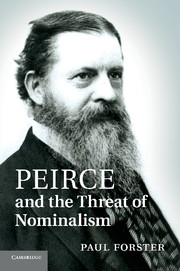Book contents
- Frontmatter
- Contents
- Preface
- List of abbreviations
- 1 Nominalism as demonic doctrine
- 2 Logic, philosophy and the special sciences
- 3 Continuity and the problem of universals
- 4 Continuity and meaning: Peirce's pragmatic maxim
- 5 Logical foundations of Peirce's pragmatic maxim
- 6 Experience and its role in inquiry
- 7 Inquiry as self-corrective
- 8 Theories of truth: Peirce versus the nominalists
- 9 Order out of chaos: Peirce's evolutionary cosmology
- 10 A universe of chance: foundations of Peirce's indeterminism
- 11 From inquiry to ethics: the pursuit of truth as moral ideal
- Bibliography
- Index
4 - Continuity and meaning: Peirce's pragmatic maxim
Published online by Cambridge University Press: 28 April 2011
- Frontmatter
- Contents
- Preface
- List of abbreviations
- 1 Nominalism as demonic doctrine
- 2 Logic, philosophy and the special sciences
- 3 Continuity and the problem of universals
- 4 Continuity and meaning: Peirce's pragmatic maxim
- 5 Logical foundations of Peirce's pragmatic maxim
- 6 Experience and its role in inquiry
- 7 Inquiry as self-corrective
- 8 Theories of truth: Peirce versus the nominalists
- 9 Order out of chaos: Peirce's evolutionary cosmology
- 10 A universe of chance: foundations of Peirce's indeterminism
- 11 From inquiry to ethics: the pursuit of truth as moral ideal
- Bibliography
- Index
Summary
So far I have explained why Peirce thinks nominalists cannot give an adequate account of the meaning of general concepts. The reason is that general concepts define continua and nominalism cannot explain continuity. However, I also noted that the nominalist can concede Peirce's argument and still deny that general concepts represent features of the world. He can argue that if Peirce is right that knowledge of individuals can never add up to knowledge of a continuum, then because experience is the only source of knowledge and individuals are the only objects known through experience, the hypothesis of real continuity is unverifiable and we should at least be agnostic about it, if not reject it outright. Moreover, since no collection of individuals is truly continuous, then, the nominalist will urge, the concept of continuity has no application in the actual world. Thus, positing real continua as objects represented by general concepts violates Ockham's razor.
This defence of nominalism hinges on the contention that the testable content of theories is limited to claims about individuals. Should the nominalist defend this view by appeal either to the metaphysical doctrine that only individuals exist or the psychological doctrine that individuals are the only objects of experience, Peirce will remain unimpressed. As he sees it, the conditions of theory testing are to be investigated in the science of inquiry, and questions in the science of inquiry – questions about the testable content of theories included – must be settled independently of facts about the actual world.
- Type
- Chapter
- Information
- Peirce and the Threat of Nominalism , pp. 64 - 77Publisher: Cambridge University PressPrint publication year: 2011



